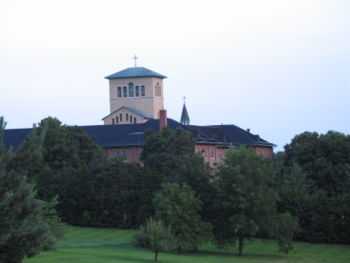Benedictine Sisters of Perpetual Adoration
Coordinates: 40°16′08″N 94°40′08″W / 40.26895°N 94.668889°W

The Benedictine Sisters of Perpetual Adoration are a congregation of sisters that follow the Rule of St. Benedict and have a Eucharistic charism. The original monastery was founded in 1874 by a group of five sisters led by Sister Mary Anselma Felber, O.S.B., who came from the young monastery of Maria-Rickenbach (founded 1857) in Switzerland.[1] Arriving in Clyde, Missouri, they founded the Benedictine Convent of Perpetual Adoration. This remains the motherhouse and largest community of the congregation.[1] It houses 550 documented relics of the saints.
The decision to come was sparked by the departure of a group of monks from the nearby Engelberg Abbey, at a time when monastic communities felt threatened by political changes taking place throughout Europe. As with many other monastic groups, they looked to the New World for a place of refuge.The monks went on to found Conception Abbey in nearby Conception, Missouri, and began to minister to German and Irish immigrants of the region.
The sisters follow a simple, contemplative way of life, formed by the Rule of St. Benedict. They support themselves by producing Altar Breads, soap, liturgical vestments and gourmet popcorn.
Since the early 1900s, they established monasteries in Chewelah, WA, Mundelein, IL, Tucson, AZ, Kansas City, MO, St. Louis, MO, San Diego, CA, Sand Springs, OK and Dayton, WY. Only 3 remain to this day.
Current monasteries
The order has houses in:
Benedictine Sisters Monastery (Tucson, Arizona)
A landmark church and working monastery for the Benedictine Sisters of Perpetual Adoration, in Tucson, Arizona, USA. The building is widely acknowledged as a classic of mission style architecture.
The Benedictine Sisters first came to Tucson in 1935 at the invitation of the local bishop, the Right Reverend Daniel Gercke. In 1940, they moved into the Spanish-Renaissance-style Benedictine Sisters Monastery, which was designed by architect Roy Place, who also designed the old Pima County Courthouse, Tucson's veterans hospital, and some notable campus buildings of the University of Arizona.
The Sisters raise money by selling the products of their orange and date orchards in their gift shop. They have recently embarked on a new venture, with help of University of Arizona Business School students, http://www.prayerfullypopped.com/
Low gluten hosts developed by the group
The Sisters produce low-gluten hosts safe for celiacs, which has been approved by the Catholic Church for use at Mass. The hosts are made and packaged in a dedicated wheat-free / gluten-free environment. Gluten content analysis found no detectable amount of gluten, though the reported gluten content is 0.01% as that was the lowest limit of detection possible with the utilized analysis technique. In an article from the Catholic Review (15 February 2004) gastroenterologist Alessio Fasano was quoted as declaring these hosts "perfectly safe for celiac sufferers." [2]
See also
- Benedictine Sisters of the Reparation of the Holy Face
Notes
- ↑ 1.0 1.1 Guide to the Catholic Sisterhoods in the United States, Fifth Edition by Thomas P McCarthy 1964 ISBN 0813213126 Catholic Univ of America Press page 4
- ↑ McNamara, Father Edward (2004-09-15). "Liturgy: Gluten-free Hosts". Catholic Online. Retrieved 2007-06-17.
Sources
- http://www.azstarnet.com/metro/195064.php
- Spirit&Life(ISSN 0038-7592), published bimonthly by the Benedictine Sisters of Perpetual Adoration, 800 N. Country Club Rd., Tucson, AZ 85716